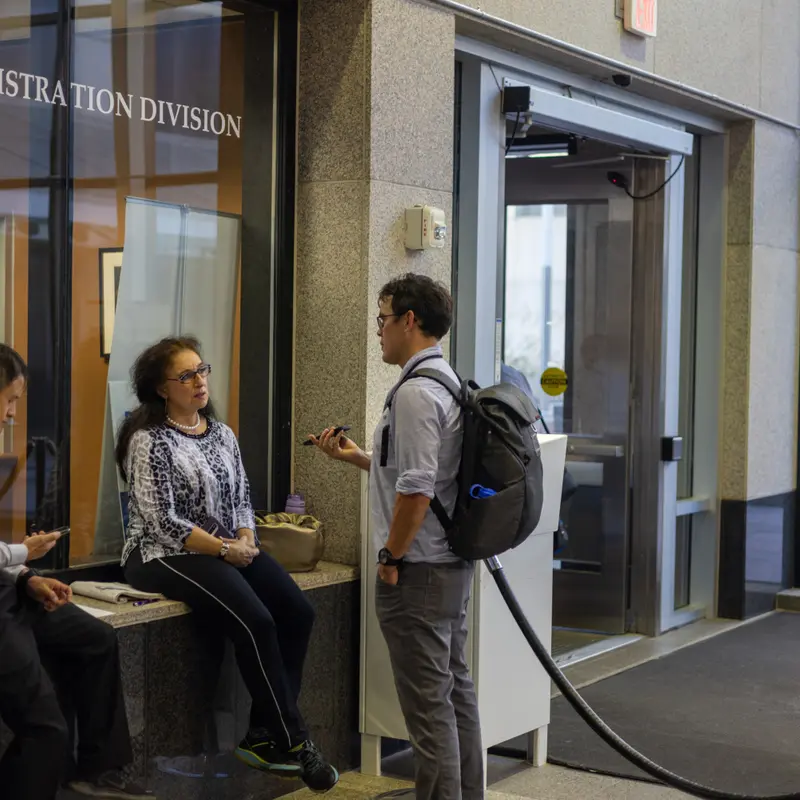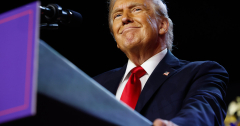ProPublica is a nonprofit newsroom that investigates abuses of power. Sign up to receive our biggest stories as soon as they’re published.
Last month a major shareholder of a publicly traded company took to social media to complain that people — perhaps short sellers — were spreading lies that could hurt his firm’s stock price.
“There are fake, untrue, and probably illegal rumors,” the post read. “I hereby request that the people who have set off these fake rumors or statements, and who may have done so in the past, be immediately investigated by the appropriate authorities.”
The Securities and Exchange Commission doesn’t typically take its marching orders from shareholders on social media. But in this case, the poster was Donald Trump, who’s just weeks away from being inaugurated and gaining the power to appoint the head of the SEC.
When Trump takes office in January, a president will for the first time be the majority owner of a publicly traded company, Trump Media, which runs Truth Social. Former SEC officials are concerned about how Trump could try to use the agency to go after the foes of his company, which accounts for more than half his fortune. They also worry that the agency isn’t up for the job of taking on Trump Media should it run afoul of securities laws.
Cases involving public companies with aggressive lawyers are difficult “even if you don’t have conflicts of interest and concerns about pissing someone important off,” a current employee in the SEC’s enforcement division said. “I don’t think anyone would explicitly say, ‘Don’t do it,’ but they’d just be like, ‘I could do another case.’”
Good journalism makes a difference:
Our nonprofit, independent newsroom has one job: to hold the powerful to account. Here’s how our investigations are spurring real world change:


The Supreme Court created its first-ever code of conduct after we reported that justices repeatedly failed to disclose gifts and travel from the ultrawealthy.



Support ProPublica’s investigative reporting today. Donate Now
We’re trying something new. Was it helpful?
In Trump Media’s short history, it has had a combative relationship with the SEC, though it has never been charged with wrongdoing by the agency.
In 2022 as Trump Media was seeking to go public, which it did through a merger with an already traded company, it threatened to sue the SEC because of what it called “inexcusable obstruction” and “obvious conflicts of interest among SEC officials and clear indications of political bias.” CEO Devin Nunes posted on the platform, “NO MORE BS!” The company never sued.
The following year, the company that took Trump Media public settled fraud charges with the SEC for $18 million after the agency found it made misrepresentations in its filings. The SEC also brought insider trading charges against several people who invested in the deal.
Other, previously unreported issues have raised alarms inside the company that Trump Media could be violating securities laws by misleading investors, according to a person with knowledge of the company.
The company has long reported in its disclosure filings that it does not track basic performance numbers for Truth Social.
In its securities filings, the company says it “does not currently, and may never, collect, monitor or report certain key operating metrics used by companies in similar industries,” such as the number of active users and ad views. It has always been a puzzling claim — akin to a TV network choosing not to track ratings. Other publicly traded social media companies do track and report such fundamental measures of success for their platforms.
But according to interviews and records reviewed by ProPublica, the company does track the numbers, and the active user count is a tiny fraction of its competitors’. ProPublica reviewed images of an internal Truth Social employee dashboard from 2022 showing the company monitored the number of active users. Internal communications from this year show the practice continued.
The SEC investigates those types of discrepancies, experts said. Securities laws prohibit companies from knowingly misleading investors about information deemed to be significant to the company’s share price.
In a statement, Trump Media accused ProPublica of “willfully misrepresenting TMTG’s public filings and the content of stolen information” and relying on “unreliable individuals with known axes to grind.” The statement also alleged ProPublica was “conspiring with others to engage in market manipulations and fraud, and we will bring evidence of this malfeasance to the relevant local, state, and federal officials.” The company did not respond to a request to explain what was “misrepresented.”
While current and former SEC officials doubt the SEC will aggressively regulate Trump Media, the company is relatively small. The agency’s oversight of companies owned by Trump associates will also be fraught and could have broader market implications. Elon Musk’s Tesla, for example, is more than one hundred times the size of Trump Media. Musk has for years fought bitterly with the SEC. He settled a securities fraud case with the agency and later declared that, “Something is broken with SEC oversight.” After Musk became one of Trump’s most important financial backers, Trump appointed him to lead a commission to target government spending it deems wasteful.
Securities experts warned that if the SEC fails to aggressively regulate companies connected to the president or his allies, it could have disastrous consequences.
“If political power buys the power to defraud, that’s a problem, not just for our politics but for our markets. American companies have an ea





